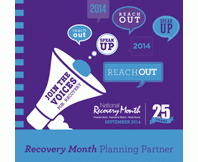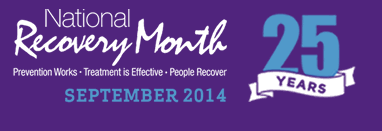September marks
National Recovery
Month, in it’s 25th year
Sarah Fecht / Reporter
What is Recovery Month? Many may have never heard of it; however, for a former addict in recovery it is a very significant time to celebrate their personal triumph over addiction.
Recovery Month is in its 25th year and ran by the Substance Abuse and Mental Health Services Administration (SAMHSA). September has officially been named National Recovery Month, raising awareness for substance abuse and mental disorders, prevention, treatment and how to reach out for recovery.
Many may be surprised how much of a need there is for people needing treatment and seeking recovery, not only in our own local community, but nationwide. According to the National Survey on Drug Use and Health in 2010, 22.1 million people ages 12 and older abuse or are dependent upon drugs and alcohol. And according to the National Council on Alcoholism and Drug Dependence, Inc., 2.4 million of those are adolescents who have an alcohol or drug problem.
According to SAMHSA, among people in Texas enrolled in substance use treatment in a single-day count in 2012: 43.9 percent were in treatment for a drug problem only. Thirteen percent were in treatment for an alcohol problem only and 43.1 percent were in treatment for problems with both drugs and alcohol.
Amanda Jackson, a former addict who has been in recovery for 5 years, was one of those Texas teens who fell into this addiction. Being introduced to drugs before reaching age 18, Jackson struggled off and on for years with her addiction.
“I had a self-image problem and this is how it started, it wasn’t any big deal,” Jackson said about the initial struggle of using meth.
As her need for the drug grew, she justified using it.
“I always justified that it wasn’t a problem because I was still going to school, I owned my own vehicle and I lived on my own I wasn’t someone out on the street, I was still being responsible,” she said.
This is a common mindset with people who struggle with an addiction. People tend to have a false image of what an addict looks like or what addiction is all about. Addiction does not discriminate.
Laura Mechell, a counselor at Charlie’s Place, confirmed this upon interview. She stated, “Growing up we hear these words: junkie, crack-head, alcoholic, some of it is what we’ve been told and of it is what we’ve seen on T.V. And so we automatically go to those visuals of what we’ve seen and we build on that.”
When asked if patients struggled with addiction because of a false mindset or misunderstanding of what addiction was, Mechell responded with haste.
“Definitely. I’d ask my patients, when they were younger what did they think a ‘wino’ was. They’d answer, it’s the guy with the overcoat with a bag in his hand standing on a street corner, so that’s why they know so if you grow up with that preconceive notion, that definition, when they look at their alcoholism, they see themselves as an alcoholic because they’re not doing ‘this’ kind of behavior and you were told that’s what an alcoholic was.
“You get movies like ‘Blow’ or ‘Savages’ … and you see those specific behaviors and these outrageous behaviors … people see that and if they’ve never been in addiction or had it in their family, their mind goes to those preconceived notions; it’s so shaped by media. When you sit down and actually talk to these people, you realize these are people, people who have just gone through a really hard time and maybe made some bad choices, but it could happen to anybody.”
“My life was consumed with this drug and the people I did it with. I hated myself because of what I was doing in my life and I had no life,” Jackson said.
As this pattern continued in Jackson’s life, she knew she was going to need help. She was in and out of different treatment facilities seeking real help, which can be challenging in itself. Even someone who has medical insurance can be turned away due to different licensing policies of different facilities.
Fortunately, she found help and was able to start her journey to recovery. “The first year of sobriety was the hardest,” Jackson said. “I was afraid to fail or relapse and I would ask myself, ‘Do I really want to do this if I’m just going to lose it? Is there really any hope for me?’ ”
One thing that motivated her to keep going Jackson said, “I was tired of my lifestyle and what I was doing.”
She also had heard about an internship competition as she began her road to recovery and applied for it. Not only was she accepted into the program, she won third place. Through that, she realized what she wanted to do and started going back to school to pursue a better life for herself.
“Everyone has their own background story to how they became an addict and people need to find their own way to recover,” Jackson said. “My rock bottom wasn’t living on the streets, it was just when I was down on myself and stuck in my head with negative thoughts. My dreams are bigger and I have more forward thinking now instead of getting depressed and down on myself.”
Jackson is now nearly finished with school at Texas A&M University Corpus Christi and is working as Web Content Producer for KRIS and KZTV.
“Now, I’m dealing with life on life’s terms. I’m more positive in my life than ever. I love breaking stereotypes; I was a drug addict, but now I’m living life!” She said.
Jackson celebrated 5 years sober this September, which is coincidental considering September is National Recovery Month. And this is why National Recovery Month was established so that people just like Jackson, who are merely looking for a fresh start find it.






